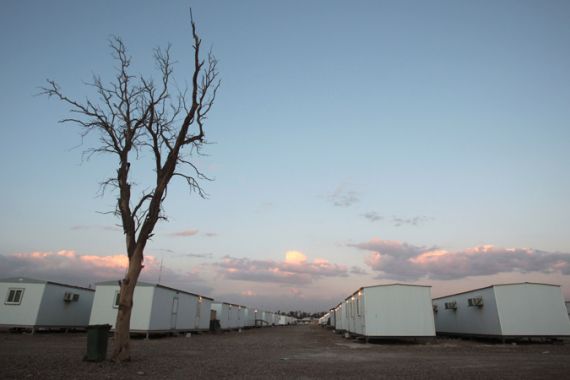Iran exiles moved to ‘transit site’ in Iraq
Members of Iranian opposition group moved from Camp Ashraf to new base in process aimed at resettling them outside Iraq.

 |
| The former US military base Camp Liberty will be the new temporary home of exiled Iranian opposition members [AFP] |
Several hundred Iranian exiles have arrived at a UN-approved site near Baghdad, in the first step in a process that aims to see them resettled outside Iraq, where they have been based for decades.
The first batch of about 400 members of the People’s Mujahedeen Organisation of Iran (PMOI), who seek the overthrow of the Iranian government, left their decades-long home at Camp Ashraf in northwest Iraq on Saturday.
Iraq’s Shia-led government, which has strong ties to Iran and sees the exiles as an irritant, has wanted to close Ashraf for years and have the group leave Iraq entirely.
The move of the exiles is part of a December 25 deal between the UN and Iraq, under which the Iranians will move to a new location called Camp Liberty, a vast former US military base near Baghdad airport.
Eventually the rest of the Camp Ashraf’s estimated 3,400 exiles are also scheduled to move to the new location.
From this new camp, a cluster of prefabricated houses, they are due to make arrangements to settle outside Iraq.
‘No future in Iraq’
“It is clear that for Camp Ashraf residents there is no future for them inside Iraq. It’s not easy for them to leave
their place but I’m convinced this is the only peaceful alternative,” said Martin Kobler, UN special envoy to Iraq, shortly after the Ashraf residents arrived at a “transit site”.
“We are arriving at the gate to [Camp] Liberty,” Behzad Saffari, the legal adviser for residents of Camp Ashraf, told the AFP news agency by telephone.
The exiles departed Camp Ashraf in 18 buses in the early hours of Saturday morning, escorted by Iraqi security forces, Saffari said, adding that the buses were being checked with scanners at the gate to Camp Liberty.
Iraq had previously aimed to close Camp Ashraf in Diyala province, which now-executed Iraqi president Saddam Hussein allowed the PMOI to set up during his 1980 to 1988 war with Iran, by the end of last year.
But Nuri al-Maliki, the Iraqi prime minister, said on December 21 that his government had agreed to extend the deadline to April, and signed the deal with the UN on moving the exiles a few days later.
The National Council of Resistance of Iran, an umbrella group that includes the PMOI, has complained about the conditions at Camp Liberty, and called for Iraqi police to be withdrawn from the camp before additional exiles move there.
‘Terrorist organisation’
The left-wing PMOI was founded in 1960s to oppose the Shah of Iran, but took up arms against Iran’s new clerical rulers after the Islamic revolution in 1979. It said in 2001 that it had renounced violence.
Spokesman Shahriar Kia has said that the PMOI is “seeking a democratic change in Iran”.
The US State Department has blacklisted the PMOI as a terrorist organisation since 1997, and says that members of the group carried out a large number of attacks over several decades against Iranian targets, and also against US citizens.
The PMOI strongly opposes the terrorist designation and is seeking to have it lifted in the US, as it has been in Europe.
In a May 2005 report, Human Rights Watch cited former PMOI members as having “reported abuses ranging from detention and persecution of ordinary members wishing to leave the organisation, to lengthy solitary confinements, severe beatings, and torture of dissident members”.
An October 2005 US diplomatic cable from Baghdad released by whistleblower website WikiLeaks discussed the cases of two people of Iranian origin who had lived in Germany, saying that after they arrived at Camp Ashraf in 1999 their travel documents were confiscated and they were told they could not leave.
The cable said that a claim by one of the two “that Ashraf residents found planning to depart were punished and threatened with death is corroborated by numerous former residents”.
Camp Ashraf was disarmed following the US-led invasion of Iraq in 2003 and came under US military protection, but American forces handed over security responsibilities for the site to the Baghdad authorities in January 2009.
Iraqi security forces raided Camp Ashraf in late July 2009, leading to clashes in which 11 residents of the camp were said to have been killed and several hundred wounded.
The camp was again raided by Iraqi security forces in April 2011, leaving 32 people dead and scores injured.